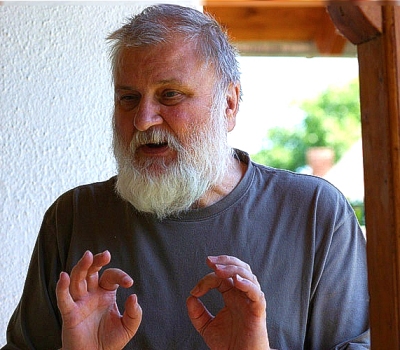Hungarian translations by Gabor Terebess
English translations by David Landis Barnhill
Note:
Gabor Terebess has translated 630 Basho’s haiku into Hungarian: http://terebess.hu/haiku/baso/terebess1.doc
To achieve this he has collected 10,000 English translations and identified each with the Japanese original (it took him two years).
From this extensive and valuable work Simply Haiku will select and feature 10 of Basho’s haiku in each issue.
朝顔は酒盛知らぬ盛り哉
asagao wa / sakamori shi ra nu / sakari kana
szirombontásban
tivornya sem zavarja
a hajnalkákat
morning glories / oblivious to all the drinking / are in full bloom
朝顔や昼は鎖おろす門の垣
asagao ya / hiru wa jō orosu / mon no kaki
kúszó hajnalka
kertkapum beláncolta
nappalra is
morning glories— / locked during daytime, / my fence gate
蕣や是も叉我が友ならず
asagao ya / kore mo mata waga / tomo nara zu
hajnalkavirág
veled vigasztalódnék
nincsen barátom
morning glories— / even they, too, are not / my friend
朝露によごれて涼し瓜の土
asatsuyu ni / yogore te suzushi / uri no tsuchi
reggeli harmat
hűti a sáros dinnyét
lucskos foltokkal
in morning dew, / dirty and cool, / a melon in the mud
暑き日を海に入れたり最上川
atsuki hi o / umi ni iretari / Mogami-gawa
tengerbe fojtja
a perzselő napot
Mogami-folyónk
thrusting the hot sun / into the sea: / Mogami River
温海山や吹浦かけて夕涼み
Atsumi-yama ya / Fukūra kake te / yū suzumi
Hőforrás-hegytől
ellátok Szeles-partig
hűvösödő est
Mount Atsumi - / all the way to Fuku Bay, / the evening cool
あやめ草足に結ばん草鞋の緒
ayamegusa / ashi ni musuba n / waraji no o
szalmaszíj helyett
kálmoslevéllel kötöm
meg bocskoromat
I’ll bind blue flags / around my feet: / sandal cords
芭蕉葉を柱に懸けん庵の月
bashō ba o / hashira ni kaken / io no tsuki
tetőpillérről
lóghatna banánlevél
belát a hold
banana leaves / will hang by the pillars: / moon over the hut
芭蕉野分して盥に雨を聞く夜哉
Bashō nowaki shite / tarai ni ame o / kiku yo kana
őszéji vihar
eső szakad dézsámba
banánfám hasad
banana in a windstorm: / a night of listening to rain / dripping in the tub
ばせを植ゑてまづ憎む荻の二葉哉
bashō uete / mazu nikumu ogi no / futaba kana
banánfám körül
ha van amit utálok
serdül a tarack
having planted the basho, I now I despise them: / the reed sprouts

 David Barnhill is Director of Environmental Studies and Professor of English at the University of Wisconsin Oshkosh. His translation of Bashō’s haiku, Bashō’s Haiku: Selected Poetry of Matsuo Basho (SUNY, 2004) includes over 700 haiku with a brief commentary on each. His book Bashō’s Journey: Selected Literary Prose by Matsuo Bashō (SUNY, 2005) is the most complete English translation of Basho’s prose, including all five travel journals, his one diary, and many of his haibun. David has also published several articles on Bashō’s spirituality and he teaches a course called “Japanese Nature Writing.”
David Barnhill is Director of Environmental Studies and Professor of English at the University of Wisconsin Oshkosh. His translation of Bashō’s haiku, Bashō’s Haiku: Selected Poetry of Matsuo Basho (SUNY, 2004) includes over 700 haiku with a brief commentary on each. His book Bashō’s Journey: Selected Literary Prose by Matsuo Bashō (SUNY, 2005) is the most complete English translation of Basho’s prose, including all five travel journals, his one diary, and many of his haibun. David has also published several articles on Bashō’s spirituality and he teaches a course called “Japanese Nature Writing.”
 Gábor Terebess was born in Szeged, Hungary, and lived as a political refugee in the sixties (living in France, USA, and Australia). He was ordained as
Gábor Terebess was born in Szeged, Hungary, and lived as a political refugee in the sixties (living in France, USA, and Australia). He was ordained as  a Zen Buddhist monk in Japan. After the change of regime in Hungary, he published his book on Zen, Folyik a híd(The bridge flows, 1990),and later started an Oriental publishing house. He also edits a Hungarian language haiku database (http://haiku.hu), and an international haiku database:
a Zen Buddhist monk in Japan. After the change of regime in Hungary, he published his book on Zen, Folyik a híd(The bridge flows, 1990),and later started an Oriental publishing house. He also edits a Hungarian language haiku database (http://haiku.hu), and an international haiku database:
http://terebess.hu/english/haiku/haiku.html). He's translated 3,000 haiku into Hungarian, and published 6 haiku books. English translations of his haiku by the Canadian-Hungarian poet, Jon Tarnoc can be read via:http://terebess.hu/english/haiku/terebess.html.